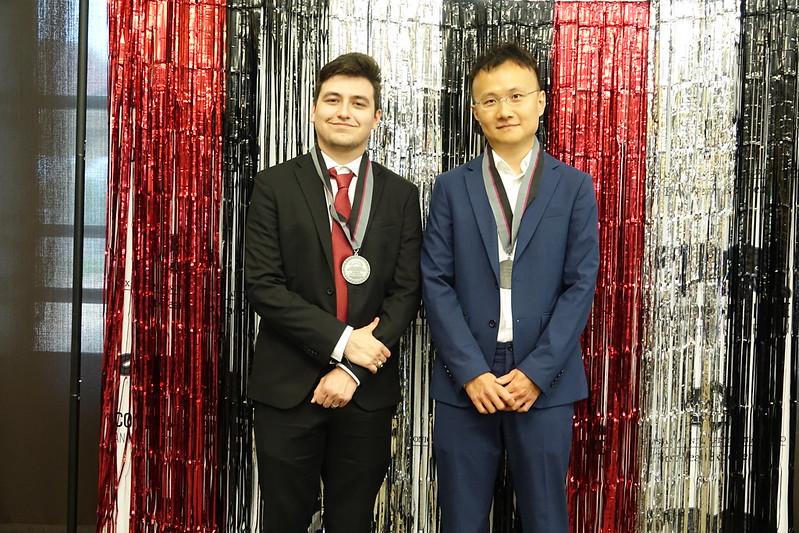When German Villafuerte walked across the stage at Texas A&M University–San Antonio’s spring 2025 commencement ceremony, he carried with him not only a bachelor’s degree in computer science but also the next step in an academic journey.
Villafuerte, who grew up in San Antonio, has been awarded a full scholarship to pursue a Ph.D. in computer science at the University of Houston—making him the first graduate from A&M–San Antonio’s computer science program to be accepted into a doctoral program at a Tier One research university.
For Villafuerte, the achievement reflects a combination of hard work, faculty mentorship, and a passion for problem-solving.
“I’ve always enjoyed computer science, not just because I was good at it, but because I love the problem-solving nature of it,” Villafuerte said. “You’re given a task to solve, but there are often many solutions. I like that process and approaching things from different angles.”
Villafuerte was attending Sandra Day O’Connor High School in Helotes when he was first introduced to computer science. After taking a few introductory classes, he knew he was on the right academic path.
After graduation, he looked at several different universities, but what ultimately drew him to A&M-San Antonio was the Achiever Promise. The last-dollar program is offered to students in the top 10% of their class and covers tuition after financial aid and any institutional scholarships have been applied.
“That really tipped the scales,” Villafuerte recalled. “It made it possible for me to focus on my studies and take advantage of all the opportunities the University had to offer.”
Villafuerte started in the fall of 2021, and over the next four years, as he excelled in his classes, he also watched the University’s campus expand with new facilities. “It was really nice watching A&M-San Antonio grow into what it is today. I was kind of growing at the same time.”
 He credits the knowledgeable and supportive faculty for helping him build a strong foundation. Among them was Dr. Zechun Cao, associate professor of computer science, who became a mentor and research collaborator.
He credits the knowledgeable and supportive faculty for helping him build a strong foundation. Among them was Dr. Zechun Cao, associate professor of computer science, who became a mentor and research collaborator.
In 2022, Villafuerte joined Dr. Cao’s lab, where he worked on a National Science Foundation–funded project to design a privacy-preserving tutoring system for Hispanic breast cancer survivors with limited English proficiency. The project created a system capable of accommodating patients who switch between English and Spanish in the same conversation.
Villafuerte played a key role in improving the system’s ability to understand and respond in this mixed-language environment—a contribution that not only helped advance the project but also deepened his passion for research.
“He really discovered that he liked doing research,” Dr. Cao said. “German took on complex problems, helped publish papers, and even presented our findings at national conferences. His drive and talent made him stand out.”
One highlight was presenting at the Great Minds in STEM (GMiS) Conference in Los Angeles, Calif., where Villafuerte and his team shared their early findings with peers and industry professionals. The experience solidified his decision to pursue graduate study.
He also did a summer internship at Iowa State University’ Center for Cybersecurity Innovation & Outreach, which involved writing a paper and exploring complex cybersecurity challenges and innovative solutions relating to threats to global internet routing.
“It was fun to collaborate and be part of a team,” he said. “And it really cemented my love for research.”
While many students take a master’s degree before attempting a Ph.D., Villafuerte applied directly to doctoral programs. With strong grades, published research, and Dr. Cao’s recommendation, he was accepted into the University of Houston’s computer science Ph.D. program with a full scholarship, including tuition, stipend, and living support.
“It’s a tremendous opportunity,” Villafuerte said. “The scholarship means I can focus fully on my classes and research without worrying about finances.”
For Dr. Cao, the milestone is especially meaningful. Not only is Villafuerte the first student from the department to reach this level, but he is also joining the same lab at Houston where Cao himself earned his doctorate.
“I know he will be very successful,” Cao said. “He has the dedication, the curiosity, and the skills to thrive in this environment. Seeing German reach this level shows what’s possible for our students. He’s paving the way for others to follow.”
Now settling into graduate courses and life in Houston, Villafuerte is exploring the many directions his Ph.D. could take him. He sees two main possibilities: pursuing an academic career as a professor, where he could inspire future students, or applying his expertise in industry.
For now, his focus is on seeing where it leads. “I want to keep solving problems and finding ways that computer science can make a difference in the real world,” he said.